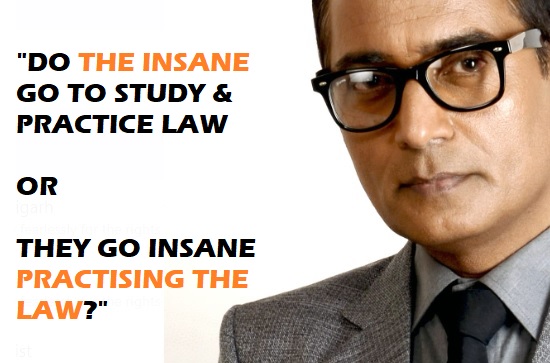Lawyers' Lives: Dealing with stress, balancing life and work in legal profession in India?

Shahid P Sayed
NewsBits.in
Law twitter recently had a discussion on whether insane people go to study law or they become insane after joining law school.
The response was mixed but there was agreement that law school or law practice makes people insane. There is a famous story about a law professor who once asked the incoming first year class point blank, 'you guys are INSANE for taking LAW as career'’. Let's see whether this anecdote has any value and what is needed to keep lawyers as ‘whole’ as they enter this field.
Typical day of a lawyer
A lawyer's day can entail encountering profoundly disturbing and morally challenging cases that deeply unsettle one's sense of humanity. Consider the unsettling situation of representing a youth falsely accused of rape by his own mother who had coerced him into the relationship earlier, and now when he is behind bars, wants him out. Despite the emotional weight, it is the lawyer's duty to maintain composure and fulfil their role as a legal advocate to secure the son's release.
Throughout the day, the lawyer confronts other weird and shocking cases, yet their professional obligations remain unchanged, regardless of personal feelings. Moreover, the lawyer must keep all the distressing details of these cases confidential due to attorney-client privilege, even from their spouse. This isolation can lead to feelings of loneliness as they process the information and seek solutions to these complex problems.
Adversarial relationships
Litigation is not a ‘church social’ where everyone talks nice and behaves well. It’s a dog eat dog world where a slight mistake or negligence can cost a lawyer his case and his peace of mind for months and years.
In the bustling world of law, where arguments are waged, cases are won or lost, and justice is pursued, there exists a silent battle that often goes unnoticed—the mental health of practicing lawyers. Exposure to intense adversarial situations and emotionally charged cases can lead to chronic stress, anxiety, and burnout. Behind the scenes of their confident courtroom presence and tireless dedication lies a profession that can exact a heavy toll on those that are practicing law.
Lack of Work-Life Balance
The demanding nature of legal work often makes it difficult for lawyers to maintain a healthy work-life balance. Long hours, high caseloads, and tight deadlines can leave little time for self-care, hobbies, and quality time with loved ones. The resulting imbalance can lead to chronic stress, strained relationships, and a compromised mental well-being.
Furthermore, the experience of law school and practicing law can change one's perspective on the world and relationships. Lawyers often become more aware of the fragility of any relationship, which can influence their thoughts and outlook. For example, attending a wedding ceremony may trigger thoughts about the jurisdiction that would handle the couple's potential breakup, which can lead to self-criticism and a sense of detachment.
Returning home, lawyers may find themselves contemplating the possibility of false allegations being made against them, causing a sense of anxiety and loneliness. The constant awareness of potential threats to personal and professional reputation can be overwhelming and challenging to cope with.
Perfectionism and Imposter Syndrome
The pursuit of perfection is ingrained in the legal profession. Perfection gets rewarded in the field of law and Lawyers are expected to produce flawless work, leaving no room for error. This relentless pursuit of perfection often leads to self-doubt and imposter syndrome—a persistent feeling of inadequacy and the fear of being 'exposed'. The constant pressure to perform at an exceptional level can significantly impact a lawyer's mental health and self-esteem.
Dress code
You may have heard the saying, 'Dress for success'; but lawyers take it to a whole new level. Squeezing into suffocating suits and torturing themselves with high heels, they embody the 'beauty is pain' mantra. How can anyone maintain their sanity with tight collars choking them and their feet screaming for mercy at 45 degrees Celsius in a Delhi District Court?
Even though the courts do relax the dress code requirements and do away with the black jacket and the robe, still lawyering at 45 degree Celsius heat is a norm in India. Imagine fighting for your career and someone life in this situation. It is not tortious to say the least.
Loneliness and Isolation
The process of preparing a case in the legal profession can be extremely isolating and demanding. Despite cases being litigated in open courts, lawyers often work tirelessly in solitude for weeks, burning the midnight oil to construct a compelling argument to presentbefore a jury.
The weight of knowing that a simple mistake can drastically alter the outcome of the case adds immense stress to the lawyer's already demanding workload. Striving to maintain accuracy and excellence, lawyers endure significant pressure to ensure they are fully prepared for each case they handle.
Residual Trauma of the client
Lawyers are the first responders of the true traumatic experience anyone went through regardless of what clients say in public. Lawyers are frequently exposed to emotionally charged cases, dealing with clients facing traumatic experiences, grief, or injustice. Constant exposure to such distressing stories can lead to vicarious trauma, compassion fatigue, and emotional exhaustion. Lawyers may find it challenging to detach themselves from the emotional burdens of their clients, which can further contribute to mental health challenges.
Senior advocate Kiran Magar-Patil of the District and Session Court in Aurangabad highlights a significant issue in the legal profession: dealing with individuals who commit heinous crimes. Magar-Patil asserts that those who perpetrate crimes against others often have underlying mental health issues that require treatment.
However, instead of receiving mental healthcare, they often receive legal relief, which poses a major problem in the practice of law. And the lawyers are the ones that carry the burden of their client’s mental illnesses, which adds further stress and burden to their lives.
Addressing Mental Health in the Legal Profession
The best way to address mental health of lawyers is to recognize its existence. We must stop thinking lawyers as some kid of supermen capable of taking any amount of distress and trauma. We must add mental health and wellbeing as a subject in law school curriculum. Budding lawyers must be taught to relax and unwind in a healthy way and not resort to substance or alcohol abuse for relief from the stress.
More practical law classes must be taught that enable the lawyers to know the ropes of the game before they set foot in the courtroom says Senior Advocate Kiran Magar-Patil, so the perennial stress of performance in a packed court room is taken of their mind. Mentors must be assigned to each solo practitioner from the Bar, who would guide the newly minted lawyer as he or she negotiates the learning curve.
In Practice
Law firms and legal organizations need to foster a culture that encourages open conversations about mental health, destigmatizes seeking help, and provides resources and support for lawyers. Implementing strategies such as providing access to mental health resources, promoting work-life balance initiatives, and offering wellness programs can make a significant difference. Creating support networks within the legal community, including mentorship programs and peer support groups, can provide lawyers with a sense of community and understanding.
Moreover, self-care practices like yoga, meditations, and other hobbies should be actively promoted among lawyers, emphasizing the importance of setting boundaries, engaging in regular exercise, pursuing hobbies, and seeking professional help when needed. In conclusion, let us heed the powerful words from that Twitter debate, 'I have not met a lawyer in my life that has not left me deeply unsettled';
This truth compels us to redefine and elevate the practice of law. As the creators of nations, we possess the ability to drive positive societal change through each case we handle. Let us embrace this challenge, working together to reshape public perception and embody the highest ideals of justice, integrity, and compassion.
[Shahid P. Sayed is an Advocate who is practicing in High Court. He holds the degrees of D.E.(Civil), B.E.(Construction), M.S.C.E.(USA), M.B.A.(USA), LL.B.(India), D.S.F. and MJ. The views are his personal]










